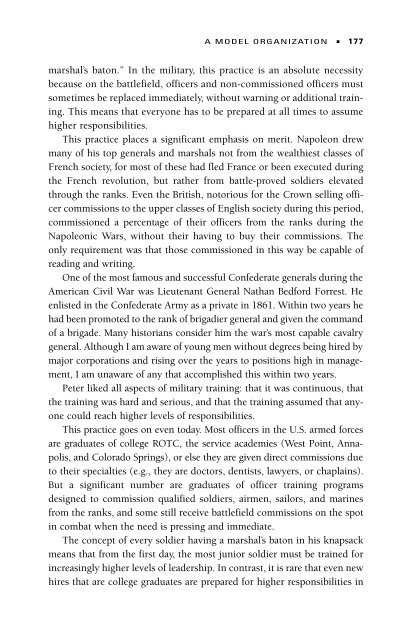A Class with Drucker - Headway | Work on yourself
A Class with Drucker - Headway | Work on yourself
A Class with Drucker - Headway | Work on yourself
You also want an ePaper? Increase the reach of your titles
YUMPU automatically turns print PDFs into web optimized ePapers that Google loves.
A MODEL ORGANIZATION ■ 177<br />
marshal’s bat<strong>on</strong>.” In the military, this practice is an absolute necessity<br />
because <strong>on</strong> the battlefield, officers and n<strong>on</strong>-commissi<strong>on</strong>ed officers must<br />
sometimes be replaced immediately, <str<strong>on</strong>g>with</str<strong>on</strong>g>out warning or additi<strong>on</strong>al training.<br />
This means that every<strong>on</strong>e has to be prepared at all times to assume<br />
higher resp<strong>on</strong>sibilities.<br />
This practice places a significant emphasis <strong>on</strong> merit. Napole<strong>on</strong> drew<br />
many of his top generals and marshals not from the wealthiest classes of<br />
French society, for most of these had fled France or been executed during<br />
the French revoluti<strong>on</strong>, but rather from battle-proved soldiers elevated<br />
through the ranks. Even the British, notorious for the Crown selling officer<br />
commissi<strong>on</strong>s to the upper classes of English society during this period,<br />
commissi<strong>on</strong>ed a percentage of their officers from the ranks during the<br />
Napole<strong>on</strong>ic Wars, <str<strong>on</strong>g>with</str<strong>on</strong>g>out their having to buy their commissi<strong>on</strong>s. The<br />
<strong>on</strong>ly requirement was that those commissi<strong>on</strong>ed in this way be capable of<br />
reading and writing.<br />
One of the most famous and successful C<strong>on</strong>federate generals during the<br />
American Civil War was Lieutenant General Nathan Bedford Forrest. He<br />
enlisted in the C<strong>on</strong>federate Army as a private in 1861. Within two years he<br />
had been promoted to the rank of brigadier general and given the command<br />
of a brigade. Many historians c<strong>on</strong>sider him the war’s most capable cavalry<br />
general. Although I am aware of young men <str<strong>on</strong>g>with</str<strong>on</strong>g>out degrees being hired by<br />
major corporati<strong>on</strong>s and rising over the years to positi<strong>on</strong>s high in management,<br />
I am unaware of any that accomplished this <str<strong>on</strong>g>with</str<strong>on</strong>g>in two years.<br />
Peter liked all aspects of military training: that it was c<strong>on</strong>tinuous, that<br />
the training was hard and serious, and that the training assumed that any<strong>on</strong>e<br />
could reach higher levels of resp<strong>on</strong>sibilities.<br />
This practice goes <strong>on</strong> even today. Most officers in the U.S. armed forces<br />
are graduates of college ROTC, the service academies (West Point, Annapolis,<br />
and Colorado Springs), or else they are given direct commissi<strong>on</strong>s due<br />
to their specialties (e.g., they are doctors, dentists, lawyers, or chaplains).<br />
But a significant number are graduates of officer training programs<br />
designed to commissi<strong>on</strong> qualified soldiers, airmen, sailors, and marines<br />
from the ranks, and some still receive battlefield commissi<strong>on</strong>s <strong>on</strong> the spot<br />
in combat when the need is pressing and immediate.<br />
The c<strong>on</strong>cept of every soldier having a marshal’s bat<strong>on</strong> in his knapsack<br />
means that from the first day, the most junior soldier must be trained for<br />
increasingly higher levels of leadership. In c<strong>on</strong>trast, it is rare that even new<br />
hires that are college graduates are prepared for higher resp<strong>on</strong>sibilities in


